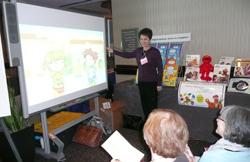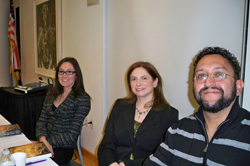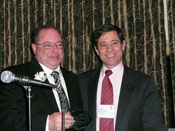IN THIS ISSUE
Hebrew Homework That Kids Want To DoCreating a Haggadah Can Deepen the Pesach Experience
Building Community Through Synagogue Websites
What is the Meaning of "Good"?
Photos From Our Travels
New on the Behrman House Blog
EDUCATIONAL FUN
Hebrew Homework That Kids Want To Do
The online games make Alef Bet Quest and Kol Yisrael irresistible
By: Terry Kaye
I was checking in at the NATE conference registration desk at the W Hotel Seattle, when Susan Goldberg Schwartz, Director of Lifelong Learning at Temple Beth Zion, Buffalo, NY, greeted me this way: “Welcome, Terry. I have to tell you how much we love Alef Bet Quest. We were planning to move our students into a different Hebrew program for the next level this semester and we had ordered all our books but the parents said, ‘We want our children to have the fun of using the same kind of software, why stop now?’ Parents want it for their kids because the kids love it. So we switched to Kol Yisrael. The decision became clear when I got Kol Yisrael 3 on the Golem Plan and saw that the series is complete. It just became obvious to me that this is the way to go."
ordered all our books but the parents said, ‘We want our children to have the fun of using the same kind of software, why stop now?’ Parents want it for their kids because the kids love it. So we switched to Kol Yisrael. The decision became clear when I got Kol Yisrael 3 on the Golem Plan and saw that the series is complete. It just became obvious to me that this is the way to go."
Educators tell us that for them the key benefits of Alef Bet Quest and Kol Yisrael are:
- Students enjoy the online activities; the ability to interact with the games and characters makes it much more attractive to them than regular Hebrew reading and writing homework. It’s not just a worksheet on a computer screen.
- Kids are motivated by the challenge of winning the games, so they practice over and over.
- Having the activities and games available online gives absent students a way to stay up with the rest of the class—one they’ll actually take advantage of.
PROJECT PASSOVER
Creating a Haggadah Can Deepen the Pesach Experience
Make seders more personally meaningful
Each year at the Passover seder we are called upon to make the experience personally our own. For some families this might represent a challenge: The story, though compelling, is an ancient one; the rituals might seem more obligatory than heartfelt; for some, just the thought of planning a seder can be nerve wracking.
 How can we embrace the seder and help bring all those around the table to a personal experience of its meaning?
How can we embrace the seder and help bring all those around the table to a personal experience of its meaning?
Last year we highlighted the program created by Rabbi Rob Morais, Director of Education and Lifelong Learning at Temple Israel, W. Bloomfield, MI, who used the Customized Family Haggadah as part of a two-evening Passover family event that taught congregation members how to run their own seder, demonstrated how to create a family Passover haggadah, and encouraged families to create their own personal writings and seder discussion questions to include.
Sharing photos of the people we love, explaining the little ways we make favorite rituals unique, putting family history down in print, adding our own questions to the classic four—these are terrific techniques for creating a personal connection to the holiday.
The Customized Family Haggadah makes this easy to do. An online project lets you upload and place photos, create captions, add questions, memories, family history. Friends and family members can be invited to join the project and add photos of their own, right online. The basic text comes from Family Haggadah, a popular and child-friendly haggadah that guides you through a seder of 30-45 minutes, and contains a checklist for seder supplies.
Read more!ENHANCE YOUR SITE
Building Community Through Synagogue Websites
Useful tips on successfully driving traffic to your temple online
Sixty-five Golem members, many with their Executive Directors and synagogue presidents, were engrossed by the Jvillage webinar last month on Using Your Synagogue Website to Create Community. Mike Kanarick, President of Jvillage Network, showed before-and-after comparisons of live websites, ways to add social media, how to simplify nagivation, and how to use your website as a powerful marketing tool.
Mike advised:
- Your synagogue website should tell a story—in addition to giving information to members and prospective members, show the life of the synagogue (photos of people, calendar of upcoming events, volunteer opportunities, a rich newsletter).
- Make visitors to your site feel welcome—with easy navigation; large, warm, and happy photos or a slide show; a greeting from the rabbi; a clear link to become a member, and newsletter sign-up.
- Break down the walls between the synagogue, the classroom, and the home. Create a greater sense of community and connectivity by showing how you are unified in your goals. For example, include your institutional mission statement on the home page.
SCHOLARLY PANEL
What is the Meaning of "Good"?
The Prophet's Wife prompts discussion of action, intent, and the challenges of an unfinished novel
By Beth Lieberman Scholars were out in full force in Los Angeles on January 9, 2011 at The Academy for Jewish Religion California, where Rabbi Daniel Bouskila and Rabbi Naomi Levy, moderated by UCLA’s Dr. Monica Osborne, gave a panel discussion on Rabbi Milton Steinberg’s The Prophet’s Wife.
Scholars were out in full force in Los Angeles on January 9, 2011 at The Academy for Jewish Religion California, where Rabbi Daniel Bouskila and Rabbi Naomi Levy, moderated by UCLA’s Dr. Monica Osborne, gave a panel discussion on Rabbi Milton Steinberg’s The Prophet’s Wife.A crowd of seminary students and members of the Los Angeles Jewish community came out despite the sadness of the day to learn from two highly esteemed contemporary thinkers.
There was quiet excitement in this relaxed atmosphere as Rabbi Levy, one of the first female rabbis in the Conservative Movement, founder of Nashuva, and bestselling author told the audience how deeply influenced she had been by Milton Steinberg’s example and his writings.
Steinberg, Rabbi Levy said, created “a world of questions about faith and reason and not just checking your intellect at the door when you want to study Judaism and God’s role in the world and to understand the place of evil in the world . . .without being God’s press secretary. What I love about Milton Steinberg is that he saw in many ways that God is big enough to handle this. So let’s ask the big questions and not be scared of them.”
Pointing out that Hosea was the first prophet to define God and Israel in terms of the husband and wife metaphor, Levy also connected the events of the time during which The Prophet’s Wife was being written –specifically the Holocaust – with what she clearly saw as Steinberg’s questions of intention and action as reflected in the novel.
Read more!
ON THE ROAD
Photos From Our Travels
JEA- Mt. Laurel, NJ, January 2011
NATE- Seattle, WA, February 2011
Behrman House regularly visits educators across the US and Canada. Look for photos of yourself here!BLOG UPDATES
New on the Behrman House Blog
Views you can use
Andy Shannon on how to keep hackers at bayTerry Kaye on finding angels
Howard Levy on branding a federation
Jessica Gurtman encourages doodling
David Behrman on the dilemma of technology


